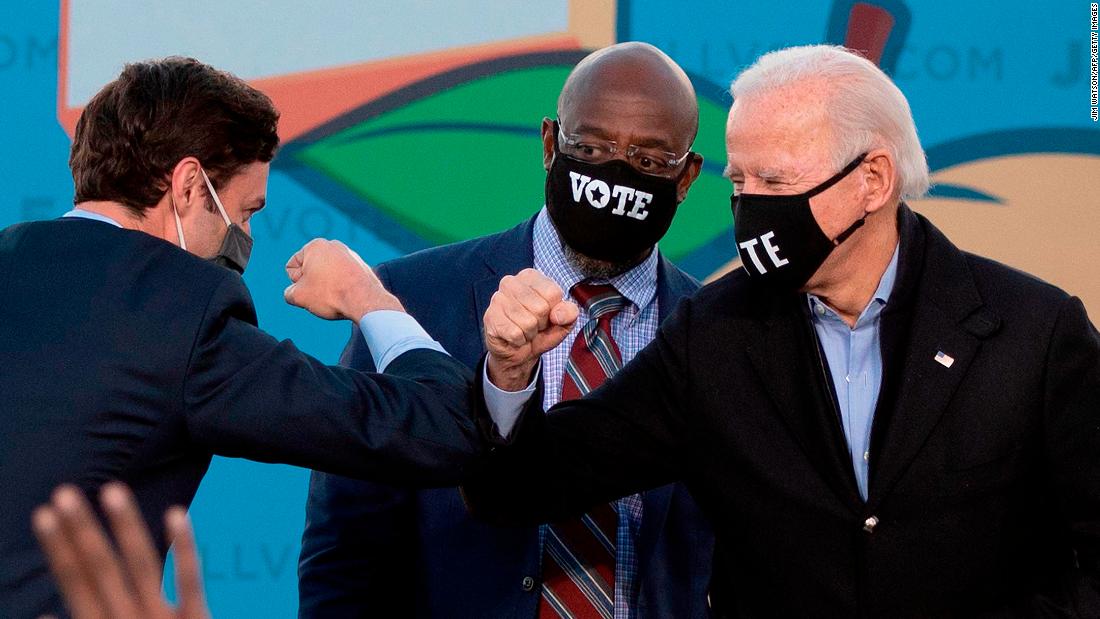Wall Street, however, is acting as if Ossoff’s victory is likely, as investors struggle to readjust their portfolios. Nasdaq futures fell 2.2%, while the yield on 10-year US Treasury bonds jumped above 1% for the first time since March.
Since November, investors have bet that the government in Washington will remain divided, restricting the more ambitious efforts of Democratic politics that can hit corporate profits and the stock market.
But with Democrats approaching 50 seats in the Senate, that calculation is changing.
“Markets seem to be concerned that a Democratic victory in the second round of the Georgia Senate election will lead to higher taxes, technology regulation, a sharper environmental focus and greater moves towards wealth redistribution,” said the strategist. Axi’s global market, Stephen Innes.
Concerns over cracking down on the technology sector are at the front and center. Facebook shares fell 3% in the premarket, while shares of Amazon, Apple and Google, parent company Alphabet, fell more than 2%.
The extent of the risk, however, remains debated. Alec Phillips, chief political economist at Goldman Sachs, pointed out on Wednesday that 60 votes will still be needed for most of the Senate legislation. Bipartisan support “would still be needed to pass laws on issues such as infrastructure, raising the minimum wage, technological regulation and environmental policies,” he said.
“While the change is in the air for the United States, the changes in US legislation may not be very radical,” Berenberg’s chief economist Holger Schmieding told clients, noting that more progressive projects could fall apart with moderate Democrats. .
In addition, a “blue wave” is likely to trigger another round of stimulus spending to support the economy during the pandemic – a big plus for markets. Phillips said Goldman Sachs planned another $ 600 billion package “in the short term” in this scenario.
Oil prices reach their highest level since February
Saudi Arabia’s decision to voluntarily cut oil production has pushed global oil prices to their highest level in more than 10 months.
The most recent: the kingdom said on Tuesday that it will cut production by 1 million barrels a day from January levels.
“We do this willingly and for the purpose of supporting our economy, our colleagues’ economies,” Saudi Energy Minister Prince Abdulaziz Bin Salman said during a news conference.
Generally speaking, the Organization of Petroleum Exporting Countries and allied producers agreed to keep production stable in February and March, report my CNN business colleagues Charles Riley and Chris Liakos. Although Russia and Kazakhstan will produce more oil in the coming months, in a deal reached this week, the impact can be offset by the Saudi Arabian retraction.
The news brought Brent oil futures, a global benchmark, to $ 54.24 a barrel. Prices have not been so high since last February. US oil is trading at $ 50.24 a barrel.
In addition to the headlines, however, analysts are concerned about the growing disagreement among oil producers as the pandemic continues. While some countries – such as Saudi Arabia – are concerned that new blockages and economic uncertainties may weigh on demand, others, like Russia, are eager to start pumping again.
Louise Dickson, an analyst at Rystad Energy, said that two factions emerged within the OPEC + group.
“The split is a blow to the alliance, again raising the question of whether its members, with very different agendas and production structures, can continue to work together,” said Dickson.
The last time the group split, in March, a brief but intense battle for market share took place between Saudi Arabia and Russia, causing oil prices to plummet.
Trump confronts China again with new executive order
President Donald Trump continues to put pressure on Chinese technology companies in the last days of his government – although it is not clear that his latest actions will have real force.
Remember, previous efforts targeting Chinese technology companies have had problems.
An order banning WeChat downloads in the United States has been temporarily blocked by a federal judge, and several courts have issued precautionary measures against government attempts to ban the reduced TikTok video app.
The new order is also due to take effect in 45 days. That’s after Trump leaves office.
“The Trump administration is still chasing its list of penalties to restrict the US-China relationship in hopes of inducing China to retaliate, further worsen ties and tie [President-elect Joe] The hands of Biden, “said Scott Kennedy, senior consultant at the Center for Strategic and International Studies in Washington. While the restrictions on these applications should be” highly disturbing “, it remains to be seen whether they will actually be implemented, he added.
Next
ADP’s private employment report for December arrives at 8:15 am ET. US crude oil stocks follow at 10:30 am ET.
Tomorrow: initial unemployment insurance claims are expected to increase to 800,000.
